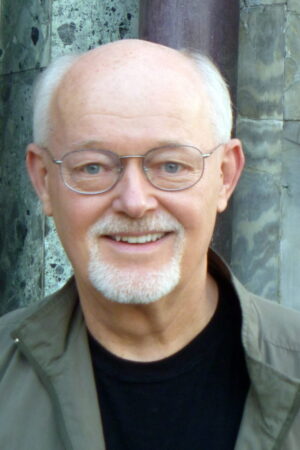By Carl Giavanti

Mike Veseth (pronounced VEE-seth) is editor of The Wine Economist newsletter and author of more than a dozen books including Wine Wars (2011), Extreme Wine (2013), Money, Taste & Wine: It’s Complicated! (2015), Around the World in Eighty Wines (2018) and Wine Wars II: The Global Battle for the Soul of Wine (forthcoming 2022). He is a sought-after speaker at wine industry meetings both in the United States and around the world.
Veseth’s writings on wine and globalization have been widely praised. Globaloney was selected as a Best Business Book of 2005. Wine Wars was chosen a Best Wine Book of 2011. The Wine Economist was named Best Wine Blog by Gourmand International in 2015. Money, Taste, and Wine: It’s Complicated received the 2016 Gourmand International award for Best Wine Writing. Around the World in Eighty Wines was named one of the 100 best wine books of all time by BookAuthority.org. Wine Wars II received a special award from Gourmand International for sustainability and wine in 2023.
A noted educator, Veseth is professor emeritus of international political economy at the University of Puget Sound in Tacoma, Wash. In 2010, he was named Washington State Professor of the Year by the Carnegie Foundation for the Advancement of Teaching and the Council for the Advancement and Support of Education.
Veseth received the bachelor’s degree in mathematics and economics from the University of Puget Sound and master’s and Ph.D degrees in economics from Purdue University.
You’re an economist. How did you come to wine, and to wine writing?
It’s a long story, which I tell in the Wine Wars books. The short version is this: I am a retired university professor and the author of several books on globalization, including Globaloney, which was published in 2005. Globaloney is a collection of case studies on how globalization developed differently in different industries (I like to say that globalization reflects its terroir).
The case studies included fast food, slow food, high fashion, the global used clothing trade, basketball, soccer … and wine. The wine chapter really captured my interest, so I decided to dig deeper into global wine markets. The Wine Economist online newsletter and a series of books on the wine business were the result.
What are your primary story interests?
There are a couple of approaches that work for me. Sometimes I see a story and try to teach the economics behind the wine situation. One of the things that drew me to wine is that everything I know about economics applies to wine in one way or another, so there’s a lot to talk about.
The second approach is to look at the business back story behind a wine, winery, region or market situation. Readers are always curious and interested in back stories, and many are drawn to the business angle.
I used to say that I wasn’t a wine writer – I am a business and economics writer who just happens to study wine. But then The Wine Economist won a Gourmand International award for Best Wine Blog. So I guess I’m a wine writer after all.
What prompted you to write Wine Wars in 2011. How is Wine Wars II different?
I’ve written more than a dozen books, and I do it to find out what I think about a particular topic. Wine Wars was written when I was trying to figure out the global wine industry. I wasn’t sure if anyone would want to read a wine business book, so I was surprised when it received a warm reception from both the business and wine communities. One wine publication actually named it a Best Wine Book of 2011. Amazing.
I decided to re-read Wine Wars on its tenth anniversary in 2021. There were some parts I was still happy with, but some chapters I wanted to change. I’ve traveled all around the wine world since 2011 to give talks at wine industry meetings, and I’ve learned a lot. I’ve changed my mind on some topics and the wine world has changed, too — of course. I needed to revise Wine Wars to bring it up to date and especially to add chapters on what I call “wine’s triple crisis”: the environmental, economic and identity crises that threaten wine today.
What would people be surprised to know about you?
I have sort of a split personality. If you visit Amazon.com and search for “Mike Veseth” you’ll find my books on wine business and economics. But if you instead search for “Michael Veseth” you’ll see the academic books and university textbooks that I’ve written. I switched from Michael to Mike when I started writing The Wine Economist. I discovered that readers were more likely to react to Mike than Michael for some reason, and I really wanted their feedback and ideas.
You write for your own site The Wine Economist and author books? What’s next for you?
A lot of my work is driven by my speaking engagements here in America and around the world, which is where I meet new wine people and visit new wine regions.
What is the one thing you’d like your readers to learn from your writing about wine?
That wine is an art, a craft, a science and also a business. It’s important to understand the business back story. I guess that’s why a big part of the Master of Wine program [at Sonoma State University?] is devoted to the business side of the wine industry.
When Wine Wars first appeared, many industry people told me that they liked it because it connected the dots for them. They understood their part of the wine business, but Wine Wars helped them see how their piece fit into the bigger picture.
What’s the best story you have written?
I am not sure it is the best story I have written, but I’ll say that the most-read single article in Wine Economist history is “Outlaw Wine? 19 Crimes Succeeds by Breaking All the Wine Marketing Rules,” which appeared in 2018.
Can you describe your approach to writing?
Most of the work is done away from the keyboard as I try out different ideas and think through my approach. I am a visual thinker, so I often try to imagine how a story would work if it were a film and what dramatic techniques would be used in that format.
I try to write in plain language, avoiding jargon when I can. I’m sure my writing is influenced by my years of university teaching, where I focused on making topics relevant to my students by connecting new ideas with familiar elements of their lives.
What are you working on now?
I am focused on The Wine Economist and international speaking engagements. I’m also helping organize a global wine business conference, which will be announced this spring. I’m trying not to write another book, but my friends all tell me that isn’t going to happen.
Do you write assigned and paid articles? How often do you blog?
I try not to accept offers of paid articles because there are many wine writers who really need that work and I’d like to see it go to them instead of me. The economics of the wine writing trade is pretty dismal these days! My wine income derives mainly from the books and speaking fees.
The Wine Economist drops once per week, usually on Tuesday morning. The typical column is 750 to 1,000 words or about the length of a newspaper op-ed piece.
What are your recommendations to wineries when interacting with journalists?
Know the story that you want the journalist to tell and help them adapt the story to their particular audience.
What advantages are there in working directly with winery publicists?
A win-win situation is when the winery gets its desired message out there and the journalist is able to make it relevant and interesting for a particular audience. A good publicist can make that happen. Fail-fail happens, on the other hand, when the winery doesn’t know or isn’t clear about its story and the journalist can’t find a useful hook.
What frustrates you most about working on winery stories?
It only takes a minute to go online and visit The Wine Economist website to see what sort of stories are there: no tasting notes, no numerical scores. lots of business-side back stories. You’d be surprised how many wineries don’t bother to do this, which makes it harder for me to make connections.
If you take days off, how do you spend them?
I like to be outside and there is always something interesting to do in the Pacific Northwest, where we live. And I never have enough time to read everything I want to read. The professor in me is always curious.
What’s your most memorable wine or wine tasting experience?
There are so many that it’s hard to pick just one! But one that certainly makes the top ten is when [my wife] Sue and I, along with her parents Mike and Gert, tasted Chateau Musar wines along with Marc Hochar, son of the famous winemaker Serge Hochar. I told the story in my book Around the World in Eighty Wines.
Chateau Musar is in war-torn Lebanon and war is not good for wine growing. Despite the obvious challenges, Serge Hochar somehow managed to produce wine every year except two — 1979 and 1984 — when the fighting made things impossible. It’s an incredible achievement and no wonder he was named a Decanter Man of the Year.
Knowing this, I was shocked when Marc poured us a glass of wine from a bottle marked 1984. “That wine doesn’t exist,” I said.
“No,” Marc said, “We made this wine, but it has never been released.”
Indeed, the wine had been opened for the very first time that morning and it smelled terrible. It seems the trucks loaded with grapes had been delayed again and again because of the war on their way from vineyard to winery. So they were in awful condition when they arrived. You and I probably would have dumped the grapes and made no wine. But it was Serge Hochar’s philosophy to take what nature gives and make wine with it. (Maybe that’s why he was called by some the “Godfather of the Natural Wine Movement.”)
The wine was made, but not released. Incredibly, the wine transformed itself in the few hours before our tasting. How did it taste? Not delicious, but very interesting. I would say it tasted like Hope and Determination. Impossible to forget. A unique experience.
Do you have a favorite wine and food pairing?
Sue and I lived in Bologna, Italy for part of a year when I was a visiting professor at the Johns Hopkins School of Advanced International Studies Center there. Our apartment was right in the center of the famous market and we were surrounded by food and wine. It was great!
One of the food-and-wine pairings that we especially enjoyed (and that we always recreate when we return to visit) is Mortadella, which is so closely associated with Bologna, and a white wine called Pignoletto Frizzante, which is grown only in the hills outside the city. A plate of the meat and a bottle of wine — preferably on the patio of the famous delicatessen, Tamburini — is just heaven.
______________________________________________________________________
 Carl Giavanti
Carl Giavanti
Carl Giavanti is a Winery Publicist with a DTC Marketing background. He’s celebrating his 14th year of winery consulting. Carl has been involved in business marketing and public relations for over 25 years; originally in technology, digital marketing and project management, and now as a winery media relations consultant. Clients are or have been in Napa Valley, Willamette Valley, Walla Walla, Columbia Valley, and the Columbia Gorge. (www.CarlGiavantiConsulting.com/Media)












![Turning the Tables on Melanie Young Melanie Young [Bobby Ryan Portraits]](https://wineindustryadvisor.com/wp-content/uploads/2023/09/MELANIE-YOUNG-HEADSHOT-CROPPED-CREDIT-BOBBY-RYAN-PORTRAITS-e1708030761224-238x178.jpg)




